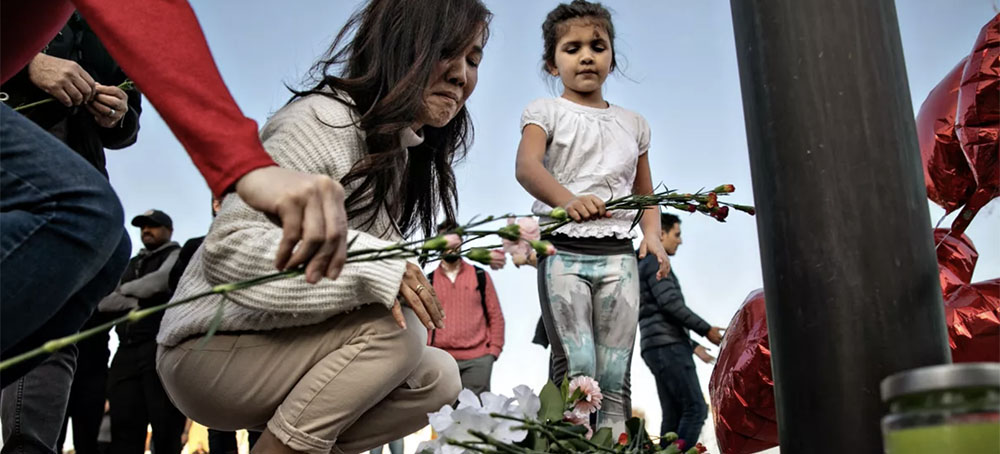The Spectre of Anti-Asian Violence in the Monterey Park Shooting
Michael Luo The New Yorker Flowers at a memorial where community members gathered for a vigil honoring the victims of the Monterey Park mass shooting. (photo: Jason Armond/LA Times)
Flowers at a memorial where community members gathered for a vigil honoring the victims of the Monterey Park mass shooting. (photo: Jason Armond/LA Times)
Waiting for details to emerge, there was the familiar apprehension and dread experienced by so many Asian Americans since attacks against them began to soar during the pandemic.
While brushing my teeth, I looked at my phone and saw a news alert about a mass shooting in Monterey Park, California, a suburb of Los Angeles. It felt like an electric circuit had snapped closed inside me, with its corresponding current of fear. Monterey Park’s population is heavily Asian––Taiwanese and Chinese, in particular. Saturday night had been the eve of the Lunar New Year. During the late nineties, when I was a young reporter at the Los Angeles Times, I’d regularly go to Monterey Park to shop at the Asian grocery stores. I opened the newspaper’s app and there it was. A gunman had killed nine people on Saturday night. (The death toll would soon be updated to ten.) The shooting had taken place in the vicinity of a local Lunar New Year festival that had ended earlier in the evening.
Soon after, I watched a news conference held in the predawn darkness of Monterey Park, with Captain Andrew Meyer, from the Los Angeles County Sheriff’s Department. Meyer described, in the clipped cadence of law enforcement, the facts that were known. “When officers arrived on scene, they observed numerous individuals, patrons of the location, pouring out of the location, uh, screaming,” he said. “The officers made entry to the location and located additional victims. The Monterey Park Fire Department responded to the scene and treated the injured and pronounced ten of the victims deceased at the scene.” The suspect was still at large. When Meyer took questions, the first one was obvious. “As far as motive,” he said, “it’s too early in the investigation to know what the motive is.”
Yet it wasn’t too early for that familiar feeling of apprehension and dread, shared by so many Asian Americans, since anti-Asian hate crimes began spiking during the pandemic. Just last week, my family and I had been at the Barclays Center, in Brooklyn, for a middle-school basketball game, when the girls behind us began getting rowdy. They had just played against my older daughter’s team and gotten off the court. The boys were playing; the game was close. “If we lose, I’m going to smack one of those Chinese girls,” one of them burst out. I turned around to speak to her. She was a child, so I was restrained. This was a teachable moment, I hoped. Then the child’s mother came over. I told her what had happened. Her daughter loudly denied it. The parent sided with her child and began to raise her voice. My wife tugged at me to walk away. Afterward, we discussed what had occurred with another Asian family that had been seated nearby. We talked about the palpitating fear we had all felt.
On Sunday morning, as I waited for more details of the shooting to emerge, inevitably, strands of history began converging in my mind. I thought about a massacre that had taken place about a hundred and fifty years earlier in Los Angeles, just a few miles west of the site of the Monterey Park shooting. On the evening of October 24, 1871, an angry mob, bearing knives, pistols, and clubs, surrounded the city’s Chinese quarter and began dragging out terrified residents. By the end of the rampage, eighteen Chinese men had been killed, fifteen of them hanged, according to most accounts, in one of the worst mass lynchings in American history.
In Monterey Park, at about half past eight o’clock in the morning, the authorities held another news conference. They revealed that the suspect was an Asian male. So that, it seemed, was that. Apparently just another mass shooting in America, the latest evidence that the country is overrun by guns. I thought about the emotions that I’d just experienced. Had I been paranoid? Too quick to believe that a racial motivation might be the cause? I returned to the history in front of me.



